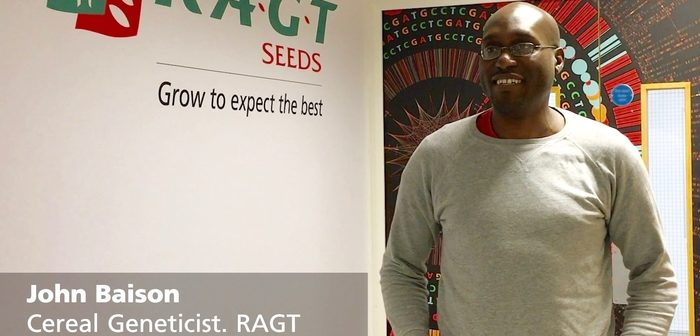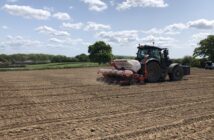A pioneering project to help identify and capture key genetic data that can be used by wheat breeders to speed up the development of more resilient varieties has been launched by RAGT Seeds.
The work aims to capture genetic variation in European bread wheat using sequencing technologies and to translate this to enhance marker-assisted selection and genomic selection in RAGT’s wheat breeding programmes.
It will involve scanning around 260 commercial wheat varieties carefully selected for their genetic diversity.
The project, headed by RAGT geneticist Dr John Baison with the mentorship of Dr Christopher Burt and Dr Richard Summers, has been awarded a grant from UK Research and Innovation (UKRI) Future Leaders Fellowship to the tune of £240,000 over four years.
In recent years plant breeders have increasingly used genetic variants to improve wheat varieties, in particular variants known as Single Nucleotide Polymorphisms (SNPs) that are linked to known traits such as disease resistance, environmental adaption, bread-making characteristics and yield components.
Breeders can use SNP molecular markers as proxies for tracking these beneficial traits. This enables them to screen many thousands of breeding lines more quickly, more cheaply and in some cases more accurately than is possible with conventional in-field assessments.
However, whilst a large number of SNPs have been identified in wheat as a species, they have been identified in relatively few varieties. These in turn tend to be more related to research, limiting their relevance to plant breeders.
In addition, there are genetic blind spots for breeders. Many beneficial traits, such as disease resistance, have been introduced by the crossing of related species into wheat, and often SNPs that relate to these beneficial introgressions have not been identified.
To address this, the project will use two DNA sequencing tools that have largely been confined to academic research, exome capture and skim sequencing, to identify genetic variants such as SNPs across a “discovery panel” of 260 genetically diverse wheat varieties used in UK, French and German commercial breeding programmes.
These varieties will be selected to ensure that genetic introgressions from related species are represented, as well as key genes from the domesticated wheat gene pool.
Exome capture allows for the scanning of the specific regions of the wheat genome that contain genes. This approach reduces the complexity of the huge 16Gb genome of wheat to roughly 250 Mb including all the genes, and so it is ideally suited for application on large numbers of lines.
“The ability to target regions of the genome we have been blind to with existing genotyping platforms will greatly enhance our accuracy in locating genes of interest so we can breed for them using molecular markers,” says Dr Baison.
However, at £500 a time, the cost of covering such a large variety database would have been prohibitive without the grant.
“I am delighted to be the recipient of a Future Leaders Fellowship, and I am very grateful that UKRI recognised the importance of the proposed project,” adds Dr Baison.
“Plant breeders and farmers have been highly successful in developing and growing wheat varieties, but unfortunately production has not kept pace with demand. Furthermore, wheat productivity is threatened by disease, competition for high quality agricultural land, resource limitations and adverse environmental conditions.
“Ultimately, the project will help us develop varieties with valuable traits, such as BYDV resistance, as well as yellow rust and Septoria resistance. This will enable growers to use less pesticide and to grow wheat more reliably.”
* UKRI’s Future Leaders Fellowships scheme aims to grow a strong supply of talented individuals needed to ensure a vibrant environment for research and innovation in the UK.
It is open to researchers and innovators from across business, universities and other organisations to enable the next generation to benefit from outstanding support to develop their careers and to work on difficult and novel challenges.




